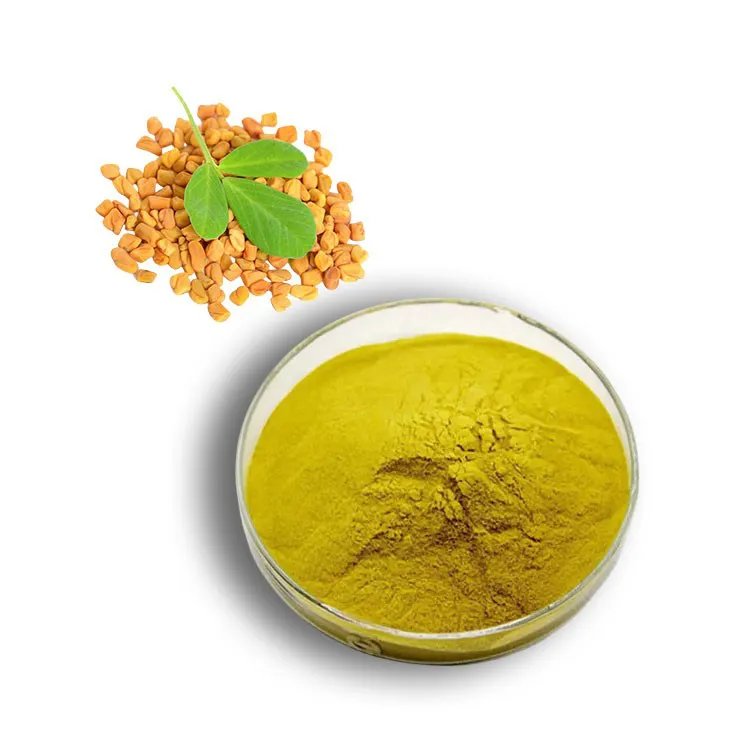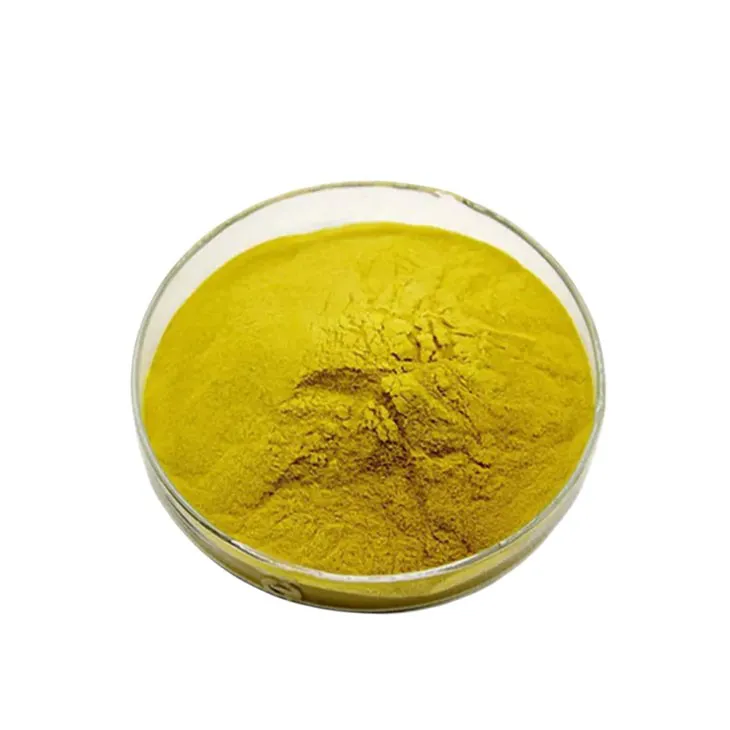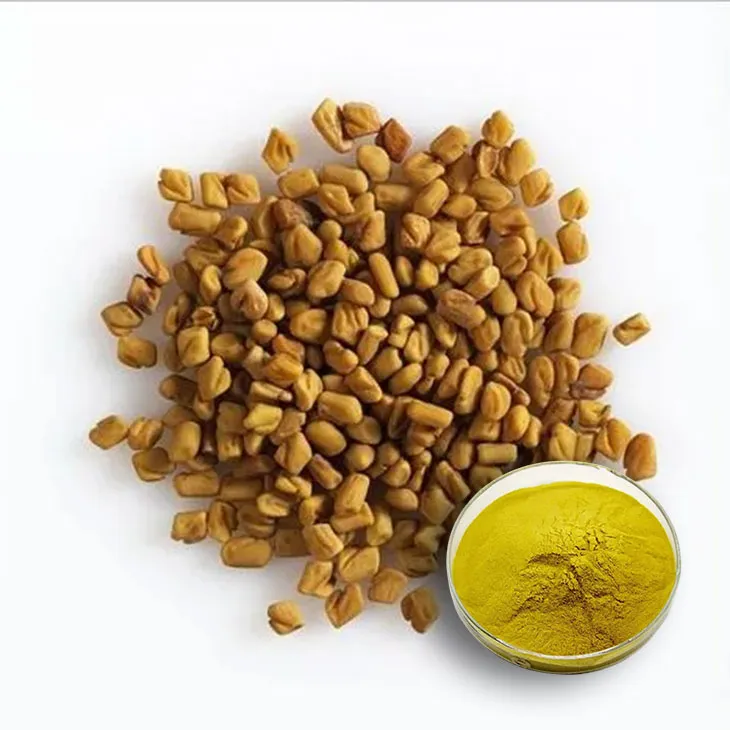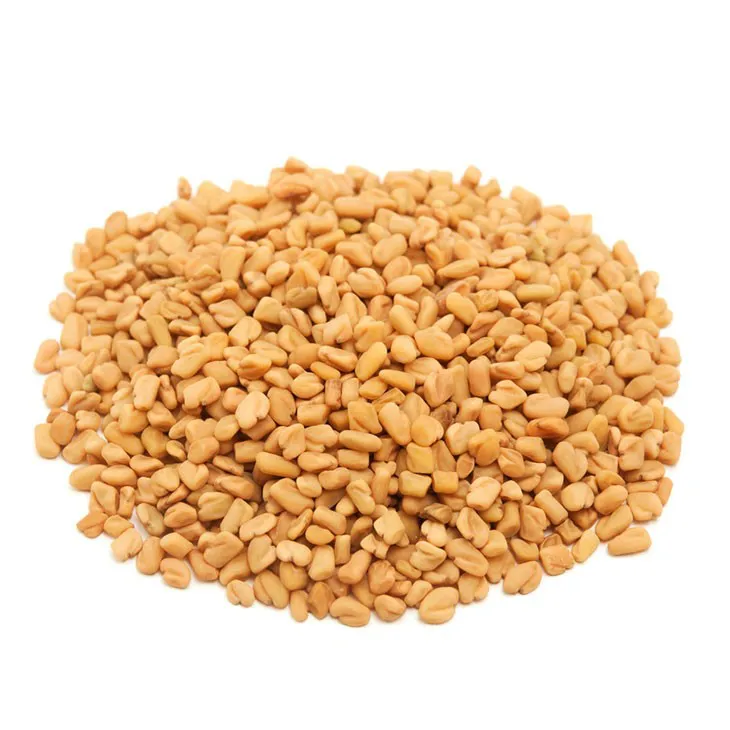- 0086-571-85302990
- sales@greenskybio.com
Is fenugreek extract powder beneficial for diabetes? Are these all safe and suitable for diabetic patients?
2024-11-12

1. Introduction
Diabetes is a chronic metabolic disorder that affects millions of people worldwide. Managing blood sugar levels is crucial for diabetic patients. In recent years, there has been growing interest in natural remedies, and Fenugreek Extract Powder is one such substance that has been studied for its potential role in diabetes management. This article aims to comprehensively explore whether Fenugreek Extract Powder offers real benefits for diabetes and assess its safety for diabetic individuals.

2. Fenugreek and Blood Sugar Regulation
2.1 Mechanisms of Action
Fenugreek contains various bioactive compounds that may contribute to blood sugar regulation. Fiber is one of the key components. Soluble fiber in fenugreek can slow down the absorption of carbohydrates in the digestive tract. This helps in preventing rapid spikes in blood glucose levels after a meal. Additionally, fenugreek seeds contain compounds like saponins, which may enhance insulin sensitivity. Insulin is a hormone that plays a vital role in transporting glucose from the bloodstream into cells for energy utilization. By improving insulin sensitivity, fenugreek may help cells respond better to insulin, thus facilitating more efficient glucose uptake and reducing blood sugar levels.
2.2 Research Evidence
Several studies have been conducted on the effects of fenugreek on blood sugar. In some clinical trials, diabetic patients who consumed Fenugreek Extract Powder showed a significant reduction in fasting blood glucose levels. For example, a study involving type 2 diabetic patients found that after a certain period of fenugreek supplementation, the patients' fasting blood glucose levels decreased by an average of [X] mmol/L. Another research indicated that fenugreek may also have a positive impact on post - prandial (after - meal) blood sugar levels. Diabetic subjects who took fenugreek extract had lower post - prandial blood glucose spikes compared to those who did not. However, it should be noted that the results of these studies can vary depending on factors such as the dosage of fenugreek used, the duration of the study, and the characteristics of the study participants.

3. Potential Side Effects of Fenugreek Extract Powder
3.1 Gastrointestinal Effects
One of the common side effects associated with fenugreek is related to the gastrointestinal system. Some people may experience diarrhea, flatulence, or abdominal discomfort after consuming fenugreek extract powder. The high fiber content in fenugreek can be a contributing factor. Fiber can increase the bulk of the stool and may cause digestive disturbances in some individuals, especially those with sensitive digestive tracts. In addition, the saponins in fenugreek may also irritate the gastrointestinal lining in some cases, leading to discomfort.
3.2 Allergic Reactions
Although relatively rare, allergic reactions to fenugreek can occur. Symptoms may include skin rashes, itching, swelling, especially in the face, lips, or tongue area. People with known allergies to plants in the Fabaceae family (to which fenugreek belongs) are at a higher risk of having an allergic reaction to fenugreek extract powder. It is important for diabetic patients to be aware of any signs of allergic reactions and discontinue use if such symptoms occur.

4. Interactions with Diabetes Medications
4.1 Hypoglycemic Effects
Fenugreek extract powder has hypoglycemic (blood - sugar - lowering) properties. This can be a concern when used in combination with existing diabetes medications. For example, if a diabetic patient is already taking medications such as sulfonylureas or metformin, the addition of fenugreek extract powder may increase the risk of hypoglycemia (low blood sugar). Hypoglycemia can cause symptoms like dizziness, weakness, sweating, and in severe cases, loss of consciousness. Diabetic patients should closely monitor their blood sugar levels if they decide to use fenugreek extract powder along with their regular medications and consult their healthcare provider for appropriate dosage adjustments.
4.2 Impact on Medication Absorption
There is also a possibility that fenugreek may interact with the absorption of diabetes medications. Some compounds in fenugreek may bind to medications in the digestive tract, potentially reducing their absorption. This could lead to a decrease in the effectiveness of the medications. For instance, if fenugreek interferes with the absorption of a particular diabetes drug, the patient may not achieve the desired blood sugar control despite taking the prescribed medication. More research is needed to fully understand these potential interactions and develop appropriate guidelines for combined use.

5. Considerations for Diabetic Patients
5.1 Dosage and Preparation
If a diabetic patient wishes to try fenugreek extract powder, the dosage is a crucial factor. The appropriate dosage can vary depending on factors such as the patient's age, body weight, and the severity of their diabetes. In general, it is recommended to start with a low dose and gradually increase it while closely monitoring blood sugar levels and any potential side effects. Fenugreek extract powder can be consumed in various forms, such as adding it to food or beverages. However, it is important to ensure that the product is of high quality and free from contaminants.
5.2 Consultation with Healthcare Providers
Before starting fenugreek extract powder supplementation, diabetic patients should always consult their healthcare providers. The healthcare provider can assess the patient's overall health status, including their diabetes control, presence of other medical conditions, and current medications. Based on this comprehensive evaluation, they can provide personalized advice on whether fenugreek is a suitable option for the patient and if so, how to use it safely. They may also be able to monitor the patient more closely for any potential interactions or adverse effects.
6. Conclusion
Fenugreek extract powder shows potential benefits in terms of blood sugar regulation for diabetic patients. However, it also has potential side effects and interactions with diabetes medications. Diabetic patients need to be cautious when considering using fenugreek extract powder. They should be aware of the possible gastrointestinal side effects, allergic reactions, and the risk of hypoglycemia when combined with medications. By starting with a proper dosage, choosing high - quality products, and consulting healthcare providers, diabetic patients can make more informed decisions about whether fenugreek extract powder is a suitable addition to their diabetes management plan.
FAQ:
Q1: How does fenugreek extract powder regulate blood sugar in diabetic patients?
Fenugreek extract powder may regulate blood sugar through several mechanisms. It contains certain compounds that can potentially improve insulin sensitivity. This means that the body's cells can better respond to insulin, allowing for more efficient uptake of glucose from the blood. Additionally, it may also slow down the absorption of carbohydrates in the digestive tract, which in turn helps in preventing rapid spikes in blood sugar levels.
Q2: Are there any side effects of fenugreek extract powder for diabetic patients?
Some possible side effects of fenugreek extract powder may include digestive issues such as diarrhea, flatulence, and abdominal discomfort. In some cases, it may also cause allergic reactions in sensitive individuals. However, these side effects are not universal and may vary from person to person. It is important for diabetic patients to start with a small dose and monitor their body's response when first using fenugreek extract powder.
Q3: Can fenugreek extract powder interact with diabetes medications?
Yes, fenugreek extract powder may interact with diabetes medications. It has the potential to enhance the hypoglycemic effects of medications like insulin and oral hypoglycemic agents. This means that when taken together, there is an increased risk of hypoglycemia (low blood sugar). Diabetic patients should always consult their healthcare provider before starting to take fenugreek extract powder to avoid any potential harmful interactions.
Q4: How much fenugreek extract powder is safe for diabetic patients to take?
The safe dosage of fenugreek extract powder for diabetic patients can vary depending on factors such as individual health status, body weight, and the presence of other medical conditions. Generally, it is recommended to start with a low dose, perhaps around 1 - 3 grams per day, and gradually increase if well - tolerated. However, it is crucial that diabetic patients consult their doctor or a registered dietitian to determine the appropriate dosage for them.
Q5: Is fenugreek extract powder suitable for all types of diabetic patients?
Fenugreek extract powder may not be suitable for all types of diabetic patients. For example, those with severe kidney or liver problems may need to be cautious as their bodies may not be able to metabolize it properly. Also, pregnant or breastfeeding diabetic women should avoid using fenugreek extract powder without first consulting their healthcare provider due to potential risks to the fetus or infant.
Related literature
- The Role of Fenugreek in Diabetes Management: A Review of Current Evidence"
- "Fenugreek Extract and Blood Sugar Control: Clinical Trials and Findings"
- "Safety and Efficacy of Fenugreek for Diabetic Patients: A Meta - Analysis"
- ▶ Hesperidin
- ▶ Citrus Bioflavonoids
- ▶ Plant Extract
- ▶ lycopene
- ▶ Diosmin
- ▶ Grape seed extract
- ▶ Sea buckthorn Juice Powder
- ▶ Fruit Juice Powder
- ▶ Hops Extract
- ▶ Artichoke Extract
- ▶ Mushroom extract
- ▶ Astaxanthin
- ▶ Green Tea Extract
- ▶ Curcumin
- ▶ Horse Chestnut Extract
- ▶ Other Product
- ▶ Boswellia Serrata Extract
- ▶ Resveratrol
- ▶ Marigold Extract
- ▶ Grape Leaf Extract
- ▶ New Product
- ▶ Aminolevulinic acid
- ▶ Cranberry Extract
- ▶ Red Yeast Rice
- ▶ Red Wine Extract
-
Acerola Juice Powder
2024-11-12
-
Sea buckthorn Juice Powder
2024-11-12
-
Citrus bioflavonoids
2024-11-12
-
Propolis Extract Powder
2024-11-12
-
Grapefruit Seed Extract Powder
2024-11-12
-
Cat Claw Extract
2024-11-12
-
Bilberry Extract
2024-11-12
-
Bitter Melon Extract
2024-11-12
-
Cocoa Extract
2024-11-12
-
Nettle leaf extract
2024-11-12





















